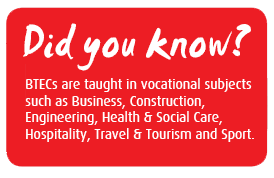What are: BTECs?
BTECs (which stands for the ‘Business and Technology Education Council’) are vocational qualifications that are taught at lots of different levels. The BTECs will most likely have come across are level 3 BTECs, which most students will study at sixth form or college, after their GCSEs and before University. BTECs usually take one or two years to complete, and being vocational they are a great way to combine practical hands on learning with theory. 
The different levels of BTEC:
BTECs come in three different ‘sizes’, the Diploma, the Certificate and the Award. The Award is the smallest, and the Diploma is the largest, with the Certificate sitting in the middle. The 'size' of the qualification relates to how in depth it is and how long it takes to study.
Qualifications are offered at seven different levels, so with three sizes and seven levels to contend with there is a lot to take in about BTECs, and that is before we even think about subjects.
To make things a bit clearer we have outlined the each of the levels below, with a description of the sort of learning you could expect to do at each, as well as the qualifications offered at that level. We have also included a rough guide to some equivalent qualifications at each level.
Level 1
Level 1 BTECs are a great starting point, and are helpful for people who want to go on to study higher level BTECs. Some level 1 BTECs are also ‘exploratory’, this means they help to give you an idea of the steps you might need to take to progress in a certain career as well as beginning to develop your knowledge.
- Diploma (equivalent to 1 GCSE at grade D to G)
- Certificate (equivalent to 1 GCSE at grade D to G)
Level 2
Level 2 BTECs are designed to give you enough knowledge within your chosen subject area to take the first steps towards a career. They won’t not teach you everything you need to know, but they will prepare you to work with supervision, and can be a great way to demonstrate your commitment to a particular career.
- First Diploma (equivalent to 4 GCSEs at grade A* to C)
- First Extended Certificate (equivalent to 2 GCSEs at grade A* to C)
- First Certificate (equivalent to 1 GCSE at grade A* to C)
Level 3
When most people refer to BTECs, they are usually talking about level 3 BTEC qualifications. They are some of the most popular for students who have finished their GCSEs and are frequently taught in colleges and sixth forms. They prepare you with the skills and knowledge required to take continue studying at university, or to head into a career.
- Extended Diploma (equivalent to three A levels)
- National Diploma (equivalent to two A levels)
- Subsidiary Diploma (equivalent to one A level)
- Certificate (equivalent to one A level)
- Award (equivalent to one A level)
Levels 4 and 5
Level 4 and 5 BTECs are designed to help learners develop their knowledge in their chosen career area and require you to demonstrate a high level of expertise in your chosen field. They will help you develop specific specialist skills. This means they can be useful for people who have already starting working in a particular job, but want to improve their skills. However, as with all other BTECs, level 4 and 5 qualifications can be a great stepping stone to higher qualifications. Higher National Certificates are BTEC level 4 qualifications and Higher National Diplomas are BTEC level 5 qualifications. These are taught in colleges and universities, and perfect for students who want to go on to complete an undergraduate degree, or head out into the workplace.
- Professional Diploma (equivalent to two years on an undergraduate degree course)
- Professional Certificate (equivalent to the first year of an undergraduate degree course)
- Professional Award
Levels 6 & 7
As with all other BTECs, Level 6 and 7 qualifications will teach you skills that can be used in the work-place and to help you to develop your understanding in a particular area. Level 6 and 7 BTECs will teach you how to carry out your own research, develop ideas, solve complex problems and lead others. Level 6 BTECs are the equivalent of an Undergraduate Degree, and are often taught in universities, whilst level 7 BTECs are the equivalent of a Master’s Degree. These are often taken by senior managers and people who have developed a very good knowledge of the field they are working in.
- Advanced professional diploma (equivalent to an Undergraduate Degree at level 6 or a Masters degree at level 7)
- Advanced professional certificate (equivalent to an Undergraduate Degree at level 6 or a Masters degree at level 7)
- Advanced professional award (equivalent to an Undergraduate Degree at level 6 or a Masters degree at level 7)
Who will they suit?
Because BTECs are vocational they will suit students who prefer to learn by doing. Rather than exams, students taking BTECs present evidence of their learning, usually by completing assignments. This means that the pressure is spread throughout the course, rather than with a lot of exams towards the end.




